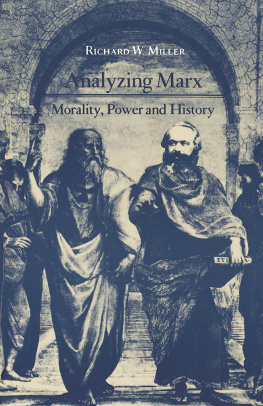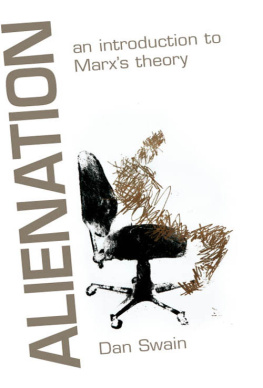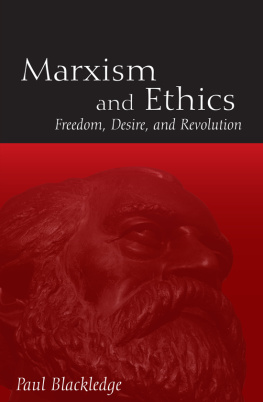First published 1983
This edition first published in 2010
by Routledge
2 Park Square, Milton Park, Abingdon, Oxon, OX14 4RN
Simultaneously published in the USA and Canada
by Routledge
711 Third Avenue, New York, NY 10017
First issued in paperback 2012
Routledge is an imprint of the Taylor & Francis Group, an informa business
1983 George G. Brenkert
All rights reserved. No part of this book may be reprinted or reproduced or utilised in any form or by any electronic, mechanical, or other means, now known or hereafter invented, including photocopying and recording, or in any information storage or retrieval system, without permission in writing from the publishers.
British Library Cataloguing in Publication Data
A catalogue record for this book is available from the British Library
ISBN 13: 978-0-415-49111-2 (Set)
Publishers Note
The publisher has gone to great lengths to ensure the quality of this reprint but points out that some imperfections in the original copies may be apparent.
Disclaimer
The publisher has made every effort to trace copyright holders and would welcome correspondence from those they have been unable to trace.
ISBN13: 978-0-415-64991-9 (PBK)
ISBN13: 978-0-415-55591-3 (HBK)
First published in 1983
by Routledge & Kegan Paul pic
39 Store Street, London WC1E 7DD,
9 Park Street, Boston, Mass. 02108, USA,
296 Beaconsfield Parade, Middle Park,
Melbourne, 3206, Australia, and
Broadway House, Newtown Road,
Henley-on-Thames, Oxon RG9 1EN
Set IBM in 10/11 pt Press Roman by
Columns, Reading, Berks, Great Britain
Printed in Great Britain
by St Edmundsbury Press
Copyright George G. Brenkert 1983
No part of this book may be reproduced in
any form without permission from the
publisher, except for the quotation of brief
passages in criticism.
Library of Congress Cataloging in Publication Data
Brenkert, George G.
Marxs ethics of freedom.
Bibliography: p.
Includes index.
1. Marx, Karl, 1818-1883 Ethics. 2. Ethics History
19th century. I. Title.
B3305.M74B718 1983 171.7 82-24999
ISBN 0-7100-9461-2
In the last quarter century, interest in Marxism has risen to a level comparable only to that which existed in the first third of this century. There are important differences, however. The claims of some one country to particular insights into Marxs thought are no longer credible as they apparently were to many in the early part of this century. Further, a wealth of previously unknown or unpublished manuscripts of Marx is now available. Thus, a major current of recent interest has been the return to Marx himself.
The discussion of Marxs ethics has played a significant, though not uncontested, part in this return to Marx. It has frequently been held that Marx had no ethics, though he is readily admitted to have had an economics, a theory of history, a political science, and a sociology. I think this view is mistaken and shall attempt to show this in the following study.
A number of methodological presuppositions should be noted at the outset. To begin with, I have looked only at Marxs own writings and those co-authored with Engels in which he is thought to have played a significant, if not dominant, part. I have not drawn in any substantial way on the writings of Engels. My reason is that there is noteworthy disagreement concerning the extent to which Marx and Engels shared the same views on various topics. Since my concern is not to write an account of what Marxists in general have said about ethics which would be as difficult as writing an account of what liberals or Christians have in general said about ethics I have omitted consideration of Engels, as well as Lenin, Mao, etc.
I have also assumed that there is a continuity to Marxs thought. Though this has been doubted or denied by many, I believe that the notorious problem of the Young Marx versus the Mature Marx is one which has been resolved. Commentators such as S. Avineri, R. Bernstein, and D. McClellan, among others, have shown that Marxs thought is of a piece. This is not to say that it did not change and develop during Marxs lifetime; but through the oftentimes bewildering maze of his thought there are continuous threads that one may follow in the reconstruction of his ethics. Thus in the discussion of Marxs views on morality and ethics I have drawn on all of Marxs writings, though particularly those after 1842. From these we can formulate a reasonably coherent account of Marxs ethics. To this extent, but only to this extent, can the present work be seen as entering into this now past dispute.
In reconstructing Marxs views on ethics, I have not attempted to psychoanalyze Marx. It may or may not be, for example, that some of Marxs views were occasioned by latent psychological conflicts against various family members or various social groups. Whether or not Marxs thought was influenced by such conflicts is a matter of indifference here. Furthermore, to proceed in this manner is in accord with the spirit of Marxs own views. He did not approach other philosophers or economists such as Kant, Hegel, and Adam Smith by seeking their inner psychological motivations or by simply writing off their views because of their class origin or class bias.
Finally, I do not maintain that Marx was completely consistent. Marx wrote for over forty years; he wrote for many different audiences and under many different conditions. It would be asking a great deal to believe that he was never inconsistent. Still, since Marx himself placed important emphasis on the systematic nature of his thought, one can hope to reconstruct a consistent interpretation of his ethical views. The task, perhaps, is not unlike that of an archaeologist who finds various bones that he tries to reconstruct into the skeletal form of the ancient animal. Some bones may be missing and others may be mixed in so as to allow for the reconstruction of animals of slightly different appearances. His task would be successfully accomplished so long as he reconstructed an animal that fitted most consistently and organically with our most complete knowledge of ancient animals. Similarly, I have tried to reconstruct the most consistent ethics to which Marx can be said to have subscribed and I have done this from the widest possible consideration of Marxs theoretical and practical work.
I begin in with a consideration of Marxs critical remarks on morality and ethics, as well as his views on historical materialism, determinism, and ideology. This amounts to a consideration of Marxs meta-ethics, i.e. his methodological views concerning the nature of morality and moral justification. This discussion allows me to respond to various objections traditionally raised against the view that Marx had an ethics at all, as well as to establish certain parameters for the reconstruction of Marxs normative moral views.
In is the notion of freedom. Accordingly, I see Marxs moral philosophy as a continuation of long-standing German and European traditions in ethics. I maintain that it is upon the basis of freedom, not distributive justice, that Marx condemns capitalism and bourgeois society. Marxs views on violence, revolution, punishment, and communist society must be understood in light of his views on freedom.
In I draw some conclusions about the insights and the value of Marxs ethics. Marx approaches the problems of ethics from a unique and instructive perspective. Not all his conclusions and suggestions are plausible or acceptable today. But of what philosopher or social scientist of any century could we say otherwise? Since Marx has been such a significant and influential figure, higher evaluative standards are often applied to him than to others. As a consequence, when he is not viewed simply as a misguided scientist, he is frequently taken for an immoralist or anti-Christ of sorts. The evidence is the evils perpetrated in his name throughout the world. But who, among the great thinkers and leaders of the past, would be spared if their views were appraised in light of consequences effected by their supposed followers? Jesuss followers have helped establish inquisitions, have gone on crusades, and fought holy wars both ancient and modern. Admirers of Nietzsche have goose-stepped their way into history. These facts should not be forgotten in our appraisal and understanding of Marx. To do otherwise is to skew the conclusions of many away from an important intellectual and practical thinker.











